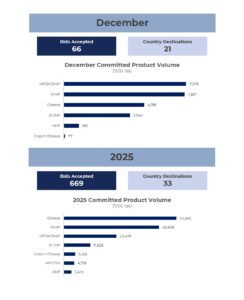The National Milk Producers Federation is pleased that Dairy Margin Coverage Program signup is under way, with key improvements aiding farmers as prices have fallen and DMC assistance becomes essential for some farms in 2026.
“An improved DMC Program couldn’t come a moment too soon,” Gregg Doud, President & CEO of NMPF, said. “We appreciate USDA’s efforts to quickly update the DMC program, and we urge dairy farmers who will benefit from the program to sign up as part of their risk-management plans.”
The DMC changes were part of the One Big Beautiful Bill Act passed last year that included multiple benefits for dairy, including making the Section 199A tax deduction and making more funds available for dairy farmers and their cooperatives to use for conservation programs.
DMC revisions published in the Federal Register include:
- An opportunity to establish new production history based on the highest annual milk production level from any one of the 2021, 2022, or 2023 calendar years. Production history established between 2014-2025 will no longer be applicable for coverage.
- USDA clarification on how new operations (i.e., those that began marketing milk after Jan. 1, 2023) will be able to establish production history.
- Eligibility for operations to enroll their first 6 million pounds of production at the Tier 1 level, up from 5 million pounds, with all additional production covered under Tier 2. Premium rate fees under Tiers 1 and 2 are unchanged.
- An opportunity for operations to make a one-time election of coverage level and coverage percentage, “locking in” those elections for a six-year period from January 2026-December 2031. Those who elect this option must participate in DMC at the same coverage levels for the six-year period and will receive a 25% premium discount for doing so.
Signup for the revised DMC runs now through Feb. 26. NMPF will keep its members apprised of key developments, with staff available to answer questions as necessary.






